- Home
- Andrew Wareham
A Place Called Home (Cannibal Country Trilogy, Book 2) Page 8
A Place Called Home (Cannibal Country Trilogy, Book 2) Read online
Page 8
"I'll see what can be fixed. There'll be someone who'll want to be helpful. If worst come to worst, I'll get you into the Administration, working with a kiap maybe."
George found the holiday tedious; he counted down the days to boarding the ship, to going back to the islands, to starting his adult life.
Lae was a tiny town with great ambitions, a port set on the edge of the Markham River where it reaches the Huon Gulf and the Bismarck Sea, a great valley behind it leading up towards the mountains of the Highlands, the sole natural route to them. The land behind Lae was fertile and carried a growing population and the town fermented with youngsters come in from the villages in search of an elusive fortune; the police were busy.
To the south the Owen Stanley Mountains blocked the overland route to Port Moresby. There were no clear passes and the tribesmen, the Orokaiva especially, discouraged entry by eating all unwary and poorly armed strangers. Due north of Lae, along the coast towards Madang, the hills were lower but no less tangled and most of the clans were no more friendly. The town was isolated except by sea and increasingly by air, apart from the tracks up the valley and towards the Highlands, bush covered and almost as high as the Alps. Gold had been found along the coast and more was confidently expected inland. Every year parties ventured westwards to discover new valleys; quite a few of them came back again.
It was a grim land, but attractive to Westerners. There was gold and the possibility of other minerals to tempt those who would take any risk and inflict any hardship on others to get rich. There were pagan souls to save for the missionaries seeking salvation from their own inadequacy. For the juvenile, there was adventure and the prospect of glory - opening unknown lands, discovering whole new peoples.
The gold mines at Bulolo and Wau were serviced from Salamaua and Lae, two weeks walk or three quarters of an hour's flying time away. The walk was simply hazardous; the flight had been described as 'interesting'. Both demanded a certain resolution, a strength of stomach.
Twenty years before the Highlands had been known to be a desert; now there was a suspicion that they might harbour a major population, possibly that mythical lost civilisation that the West seemed to believe in - the land of She and Shangri-La. The speculation was rife, and George wanted to be part of the actuality.
Ned pulled strings, surprised to discover just how many he had access to. He spoke to the Administration and called on the kiap and dropped in at the police station; he talked to the agents who placed his cocoa and faced keen competition for his contract. Two full days in Lae and he could introduce George to Mick Masters, owner of a freight company based at the airstrip.
"G'day, George!"
"Sir."
"Stuff the bloody 'sirs'. I'm Mick. Your old man says you speak Pidgin and Tolai and you can read and write and add up, too."
George grinned, nodded cautiously.
"Don't over commit himself, do he, Ned? You handle a rifle, George?"
"Yes, better than fair."
"She'll do me. Quid a week and your keep, more when you earn it - like when you go upcountry. Stay in Lae for a year while you're learning then set up an outstation as a partner, if you can do it. Suit you?"
"Please, Mick."
"Right, you're on!"
They shook hands.
George turned to his father.
"I'll pick up my gear then, Dad. Where do I go to?"
“Nowhere till Friday. We’re sailing then. You can keep your mother company for another three days. Anyway, we need to get you an outfit.”
“Good idea, Ned. Bring him across before you go, I’ve got a couple of rooms in my place he can have. He can eat with me, be easier than living on his own.”
Ned nodded dubiously, caught Masters’ eye and laughed embarrassedly.
“Right then, Mick. He’ll be right.”
“He will be.”
Kit was easy to buy; both Steamships and Burns Philp had stores in Lae and were used to the needs of whiteskins going inland.
A patrol box, a sheet-steel trunk easy to keep free of ants, was the first necessity, followed by naphtha and flea powder to keep it uninfested and then multiple supplies of cotton and linen clothing and boots.
“One Swiss Army Knife; a compass; a patent lighter – it’s no good relying on matches, the bloody things always get damp. First aid kit, including quinine in quantity – take it for any fever – you may think you’ve got dengue, but you’ll probably have bloody malaria as well. One thirty-eight revolver and two hundred rounds – not for public display.”
“I thought you couldn’t get handguns up here, Dad.”
“You can’t.”
“Oh?”
“So you ‘aven’t got one, ‘ave you?” Said in a very patient, long-suffering tone.
“Oh! I see.”
“Thank Christ for small mercies! Don’t use it unless you must. If you do ‘ave to use it, aim carefully and kill the bastard! Get in or get out, but don’t piss about half-way! Right, son?”
Ned shook his head, the boy had had it too easy; he had some learning to do.
“Last thing – your boss.”
“Mick?”
“That’s ‘is name. He’s queer, bent as a three speed banana! I think you’ll be alright – no reason why you shouldn’t be, but keep your eyes open if any of his friends come visiting – they might make a mistake!”
“You mean he’s a… one of them?”
“Yeah. You been to boarding school, to got to know about that.”
“Well, yeah, but you wouldn’t expect to find one of them up here though.”
“Don’t be daft, this is just the place to find ‘em. Down in Australia they got laws to put ‘em away for ten years at a time for just smiling at another bloke. There ain’t no laws against it at all up here. Probably half of the single blokes, the older ones especially, are up ‘ere because they can live safely, poor sods! There ain’t no ‘arm in them, for the most part, no more than in anybody else.”
“I’d have thought it was a bit hard for them up here. Sort of place like this needs a real man, don’t it?”
“Christ, nipper, give over! If that’s what you think then I made a bloody mistake sending you down South to get an education!”
George moved into his new quarters with some trepidation.
It was raining, quite slowly, half-inch an hour but unstopping. The drainage ditches were full and great puddles across the strip had stopped all flights in and out.
“How long does the Wet last here, Mick?”
“Forty weeks, more or less, raining night and day. The other three months it only rains at night, mostly. Can be a nuisance, but we don’t never go thirsty here, not like Moresby.”
George settled in, found he had a wing of the vast bungalow to himself – bedroom, sitting room, shower separate from everyone else. Eating was communal in the big dining room, meals shared by any number from three to thirty of different races and nationalities, with the obvious exception of the locals – entertaining kanakas to dinner would soon have led to Mick’s deportation. Mick shared his quarters with a young mixed-race lad who he introduced as John; he made no comment, George asked no questions.
It took George less than a week to realise that literacy was his only superiority, his sole justification for existence in New Guinea. Running a large scale business over a distance demanded record-keeping and efficient communication – both of which were dependent on the ability to read and write. The wisdom of the Administration’s anti-education policy became clear – schooling for all would result in the end of colonialism, the obsolescence of the foreign master. The Australians had observed Indian experience and took great care that only a tiny percentage of their own native population should receive any education and that mostly in bigotry in denominational mission schools.
A month and George had learned the basics of storekeeping and freighting as practised in New Guinea. Order from Australia, well in advance of desired delivery; check in bulk at the wharves; break d
own and mark up by one hundred per cent for sale in Lae, by four hundred per cent for distribution inland. All sales to be made in cash, or gold dust weighed on their own scales.
There were four hundred white, mostly Australian, miners up on the goldfields, together with an uncounted number of imported kanaka labourers, isolated in an inhospitable, sparsely inhabited mountain range where two hundred inches of rain leached the soil and made the growing of recognisable food plants impossible. Everything they ate had to go up to them – nothing was produced locally; they were a captive market.
Mick soon became aware that his young apprentice was quick to learn but wanted him to get a little more maturity before he went out on his own; he took appropriate measures to deal with the problem.
His solution was orthodox and wholly acceptable to George and took the form of Maria, an eighteen-year old part-Samoan girl, an outcaste desperate to avoid outright prostitution and forced to be content with concubinage and ever-hopeful that she might reach the magical Land Down South where Happiness lay. She was tall and slender and smiling and still young despite being abandoned by five men in a row in the seven years since her mother first sold her. George met her at the dinner table as another of the flow of transients and was amazed to discover that she fancied him and was flattered to take her to his bed; he was content for the while to satiate his desire for adventure in her.
He learned a great deal in the following months and came close to growing up. He travelled along the coast by island boat and visited Madang and the port village of Salamaua and started to pick up words of the local languages. He learned how to buy copra and how to recognise and avoid the opium-smuggling junks on their way south to Australia. According to Mick the junks brought ten times as much South as the Australians used, the bulk of the ‘mud’ being transhipped out of Brisbane and Sydney to San Francisco, American Customs unaware of the route. George wondered how he knew, but asked no questions – every man had to make his stake somewhere.
By mid-year he was anxious to go up to the fields.
Mick decided he was big enough to take on the responsibility.
“I’m going South for a few weeks, George. We need a plane of our own rather than buying space from whoever’s part-empty any time. I’ll pick up an old crate sold out cheap from the Air Force, and a bush pilot to fly her and keep her in the air. Shouldn’t take long. You take over on the labour side, mate.”
There was no labour available on the fields because the local population was sparse and recently contacted and had no notion of paid employment. The clans within contact of the goldfields were far more inclined to raid them in search of heads and meat than to work for them. Experience of the police and their rifles had caused the clansmen to keep well away in late years and the workers remained largely uneaten, but still wholly imported.
The boys on the labour line were paid four times as much as could be earned anywhere else in the Territory, far above the legal maximum laid down by the Administration. They could spend nothing during their time on the creeks and came back to their villages, those who did, as wealthy men, and there was always an over-supply ready to be flown up. Working conditions were appalling – cold, wet, poorly fed, diseased and often brutal – but they could learn, and many of them went out prospecting on their return and a number had set up their own tiny family-scale alluvial operations, producing a few ounces a year from their own streams and horrifying the Administration by their enterprise.
Gold-buyers flew or trekked in to the fields, some of them honest, many more viciously criminal. Most of the prospectors carried handguns in response and the very few police posted to Bulolo and Wau noticed little and reported less. A few self-styled ‘soldiers of fortune’ had appeared as well, occasionally escorting prospecting parties further out; Errol Flynn, now making a reputation in other fields, claimed to have been there, and a few miners said they had seen him, or someone very like him at least.
George collected his little group and watched them onto a shiny new Junkers Trimotor, half cargo, the front given up to a dozen seats. He got out again half an hour later, walked a few paces uphill and decided he liked flying – if only because it was so much preferable to walking over the landscape he had just observed. The grass strip was short and on a distinct slope, sufficient to assist take-off and brake landings; it could be described as picturesque, provided one did not peer too deeply into the ravine at its bottom end. Glancing down, George was sure he could see a set of wings.
While he was organising his labourers one of the freighters landed carrying a piece of a dredge. The huge machines had been brought by ship to Lae where they had been disassembled, sometimes chopped up, into two-ton lumps. Because the shapes were often awkward, the top of the planes’ fuselage had been sawed out and the machinery commonly projected several feet up into the air. George shook his head; it was not quite unbelievable. The Junkers taxied under a wooden crane arm and the gold mining plant was neatly lifted out and lowered onto a litter which was picked up by eighty men and slowly carried downhill to the creek. He was sufficiently educated to notice the contrast of modern aircraft and the gang-labour of the Pyramids.
Two minutes of enquiry directed George to the miner who had contracted for his dozen boys. He marched them across and delivered them against signature. Each carried a week’s food – tins of corned beef and fish and packets of navy crackers – and these were taken from them and locked into a safe. The miner turned to the wooden cupboard on the other side of his office shack and pulled out bags of gold dust.
“Right, mate. Eighty four quid in air fares, and a hundred finder’s fees. Gold’s at a fiver the Troy ounce, so that’s thirty-seven ounces of dust.”
“Nine nine nine fine, cobber?”
The miner grinned, offered a smoke, laughed outright at George’s clumsy roll-up.
“Dunno what it is, mate, not for sure. I’m Jacky, by the way.”
“George Hawkins.”
They shook formally, establishing a business relationship.
“Look, George, you knows ‘ow it is, up ‘ere. We ain’t got an assay and you can’t tell by eye. This stuff’s pretty good, but it probably ain’t pure to one part in a thousand. I’ve got the better part of three hundred ounces ‘ere. What say you take it down to the coast for me and put it through the assay there? Take your dues and a five per cent cut and bank the rest for me?”
“She’ll do, Jacky. I’ll be back in a few days and some time after that my boss will have a plane of our own to run food up. What do you reckon, flour and corned beef?”
“That’ll pay, but don’t forget baking powder, mate. Chance of a bit of fresh bread will go down well.”
“Good idea! What else makes sense?”
“Tea and rice. The kanakas don’t like rice, but they’ll eat it. Get a load of kaukau – sweet potato – when you can, they’d rather eat that. What else? Medicines, George, we’re always short of them, carbolic and something for the quickshits, that’s really givin’ us gyp at the moment. Something with some flavour, to chew on, and don’t forget tobacco, for Christ’s sake!”
George wandered to the top of the strip, gold dust in a canvas bag over his shoulder, looked around as he waited for his plane to be turned round and make its way uphill. There was no hotel, no overnight accommodation of any sort, so it was fly in and out on the same morning, as early as possible. The village, settlement, hamlet, slum, call it what you liked, was on the hillside, on steps carved out of the rain forest, a mixture of bamboo lean-tos, canvas tents, rough-built shacks, all flimsy and damp. The claims were all alluvial, wooden flumes leading creek water and mud through separator boxes and paddles, makeshift and raw. The big companies’ barges were part assembled in the valley, would soon bring an air of industrialisation to the river bottom, but the over-all air was frontier, the men still hard and individual. George wanted to be part of it, but he was too hard-headed to wish to prospect on an established field where all the best had been claimed already. He might find his own
mine, one day; for the while he would profit by supplying this one.
The flight back to Lae was dangerous. Thick, active cloud forced the Junkers low, almost to the rain forest canopy, made the pilot follow the valleys to the sea, the prop wash blasting leaves up in a trail behind them. They clung to the coast round to Lae, as near to the streak of beach as they could get in case they were forced down, took two hours to get in, heavy rain on their tail, the strip about to close down. There was no other airstrip with all-weather facilities within a thousand miles and they had fuel for less than an hour when they landed.
George was white-faced when they finally got down, not helped by the pilot swearing and muttering that that had been another ‘close one’. He dumped the bag containing a stone and a half of gold in the corner for the morning, spent the afternoon and evening relaxing in Maria’s care.
The assay office found the gold more than ninety per cent pure and credited him with a fraction over one thousand four hundred pounds.
After settling up he had a commission of more than sixty pounds. When Mick returned he tried to pay the money into the firm but was ordered to put it into his own bank.
“This one’s your deal with Jacky, George. He didn’t make a contract with the firm – he trusted you, personally, so it’s your money, and quite right, too!”
A Place Called Home
Chapter Four
The Vickers Vimy, recently of the Australian Air Force, flew sedately in after a seven hour hop from Port Moresby. It was a big biplane bomber capable of a hundred miles an hour and able to carry a bomb-load of just over a ton in war conditions. Stripped of all armour plate and guns and their mountings, crew of two men only and with fuel sufficient for just three hours in the air, she would take thirty hundredweight of flour and bully beef and canned fish, could fly up and back to the goldfields once a day for the better part of a month between overhauls.

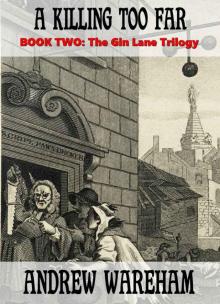 A Killing Too Far
A Killing Too Far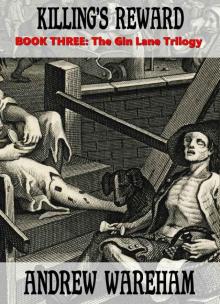 Killing's Reward
Killing's Reward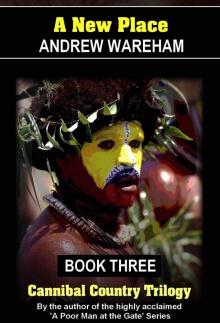 A New Place
A New Place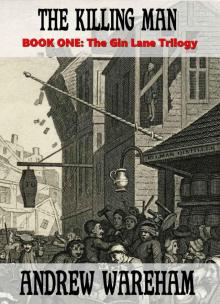 The Killing Man
The Killing Man Bold and Blooded
Bold and Blooded The Breaking Storm (Innocent No More Series, Book 2)
The Breaking Storm (Innocent No More Series, Book 2)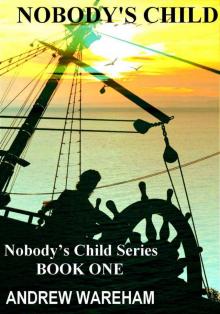 Nobody’s Child
Nobody’s Child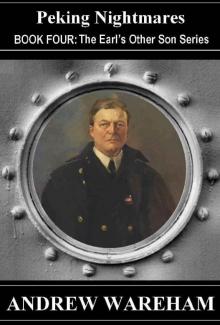 04 Peking Nightmares (The Earl’s Other Son Series, #4)
04 Peking Nightmares (The Earl’s Other Son Series, #4)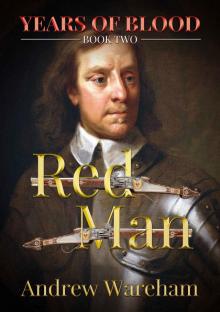 Red Man
Red Man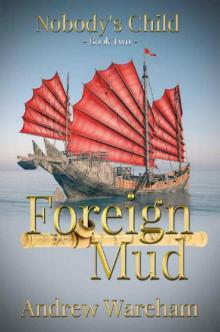 Foreign Mud
Foreign Mud The Gathering Clouds (Innocent No More Series, Book 1)
The Gathering Clouds (Innocent No More Series, Book 1)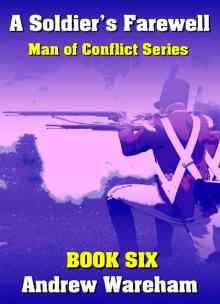 06 A Soldier’s Farewell (Man of Conflict #6)
06 A Soldier’s Farewell (Man of Conflict #6)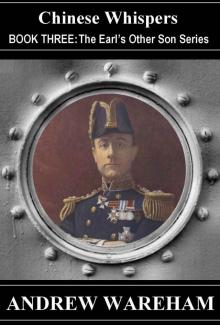 Chinese Whispers
Chinese Whispers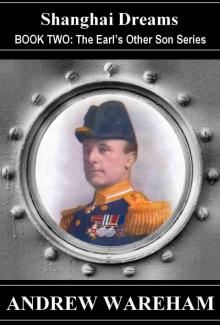 02 Shanghai Dreams (The Earl’s Other Son #2)
02 Shanghai Dreams (The Earl’s Other Son #2)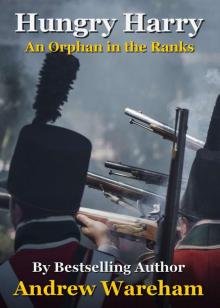 Hungry Harry: An Orphan in the Ranks
Hungry Harry: An Orphan in the Ranks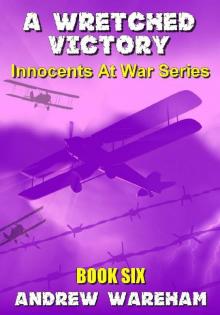 A Wretched Victory (Innocents At War Series, Book 6)
A Wretched Victory (Innocents At War Series, Book 6)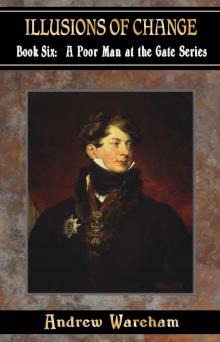 Illusions Of Change (A Poor Man at the Gate Series Book 6)
Illusions Of Change (A Poor Man at the Gate Series Book 6) The Wages Of Virtue (A Poor Man at the Gate Series, Book 8)
The Wages Of Virtue (A Poor Man at the Gate Series, Book 8)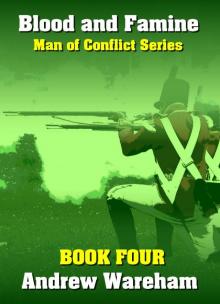 Blood and Famine (Man of Conflict Series, Book 4)
Blood and Famine (Man of Conflict Series, Book 4)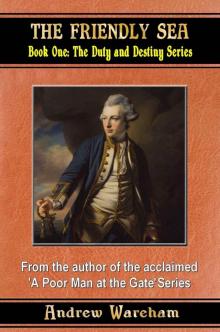 The Friendly Sea (The Duty and Destiny Series, Book 1)
The Friendly Sea (The Duty and Destiny Series, Book 1)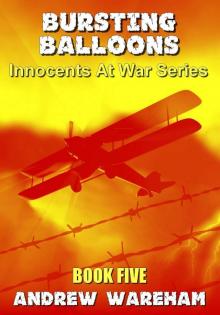 Bursting Balloons (Innocents At War Series, Book 5)
Bursting Balloons (Innocents At War Series, Book 5)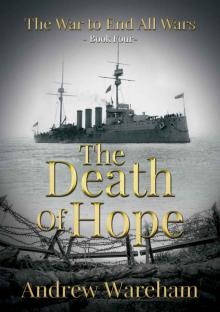 The Death of Hope
The Death of Hope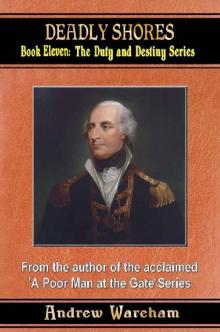 Deadly Shores (The Duty and Destiny Series, Book 11)
Deadly Shores (The Duty and Destiny Series, Book 11)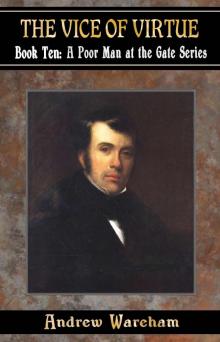 The Vice Of Virtue (A Poor Man At The Gate Series Book 10)
The Vice Of Virtue (A Poor Man At The Gate Series Book 10) Virtue’s Reward (A Poor Man at the Gate Series, Book 11)
Virtue’s Reward (A Poor Man at the Gate Series, Book 11)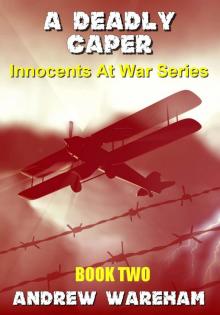 A Deadly Caper (Innocents At War Series, Book 2)
A Deadly Caper (Innocents At War Series, Book 2)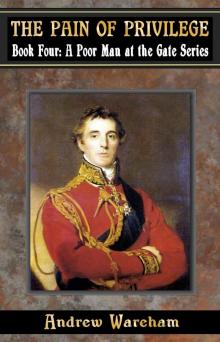 The Pain Of Privilege (A Poor Man at the Gate Series Book 4)
The Pain Of Privilege (A Poor Man at the Gate Series Book 4)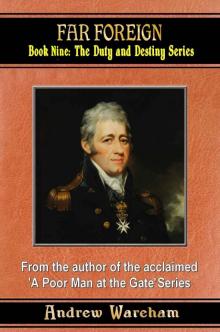 Far Foreign (The Duty and Destiny Series, Book 9)
Far Foreign (The Duty and Destiny Series, Book 9)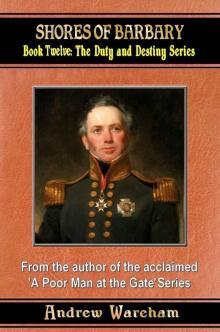 Shores of Barbary (The Duty and Destiny Series, Book 12)
Shores of Barbary (The Duty and Destiny Series, Book 12)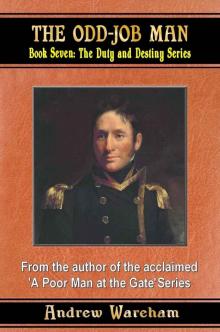 The Odd-Job Man (The Duty and Destiny Series, Book 7)
The Odd-Job Man (The Duty and Destiny Series, Book 7)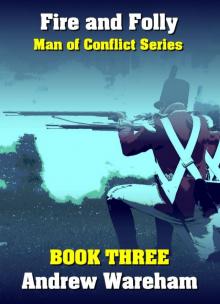 Fire and Folly (Man of Conflict Series Book 3)
Fire and Folly (Man of Conflict Series Book 3)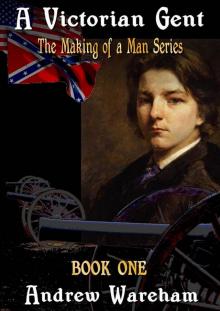 A Victorian Gent (The Making of a Man Series, Book 1)
A Victorian Gent (The Making of a Man Series, Book 1)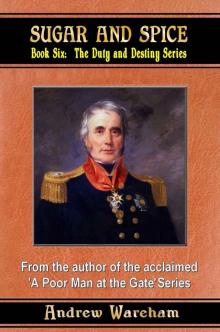 Sugar and Spice (The Duty and Destiny Series, Book 6)
Sugar and Spice (The Duty and Destiny Series, Book 6)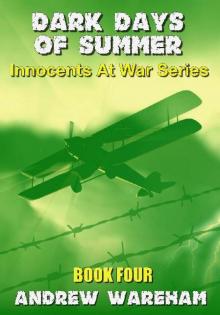 Dark Days Of Summer (Innocents At War Series, Book 4)
Dark Days Of Summer (Innocents At War Series, Book 4)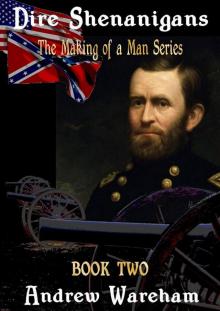 Dire Shenanigans (The Making of a Man Series, Book 2)
Dire Shenanigans (The Making of a Man Series, Book 2)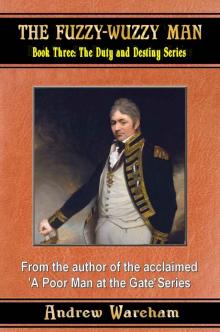 The Fuzzy-Wuzzy Man (The Duty and Destiny Series, Book 3)
The Fuzzy-Wuzzy Man (The Duty and Destiny Series, Book 3) Privilege Preserved (A Poor Man at the Gate Series Book 5)
Privilege Preserved (A Poor Man at the Gate Series Book 5)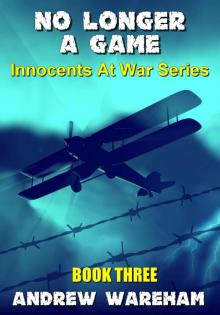 No Longer A Game (Innocents At War Series, Book 3)
No Longer A Game (Innocents At War Series, Book 3)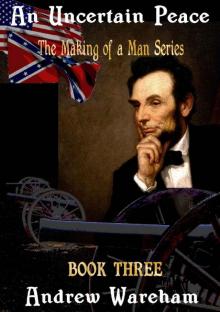 An Uncertain Peace (The Making of a Man Series, Book 3)
An Uncertain Peace (The Making of a Man Series, Book 3)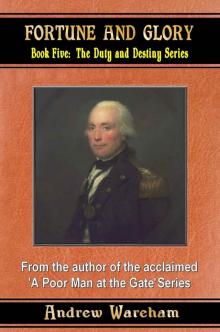 Fortune And Glory (The Duty and Destiny Series, Book 5)
Fortune And Glory (The Duty and Destiny Series, Book 5) The Old Order (A Poor Man at the Gate Series Book 7)
The Old Order (A Poor Man at the Gate Series Book 7)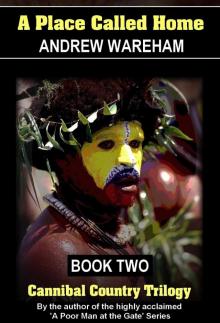 A Place Called Home (Cannibal Country Trilogy, Book 2)
A Place Called Home (Cannibal Country Trilogy, Book 2) Nouveau Riche (A Poor Man at the Gate Series, Book 2)
Nouveau Riche (A Poor Man at the Gate Series, Book 2) The Privateersman (A Poor Man at the Gate Series Book 1)
The Privateersman (A Poor Man at the Gate Series Book 1)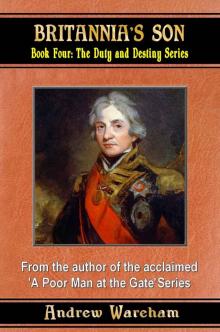 Britannia’s Son (The Duty and Destiny Series, Book 4)
Britannia’s Son (The Duty and Destiny Series, Book 4)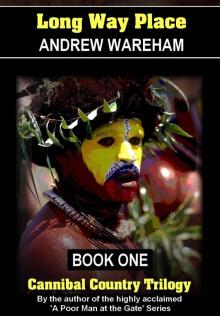 Long Way Place (Cannibal Country Trilogy, Book 1)
Long Way Place (Cannibal Country Trilogy, Book 1)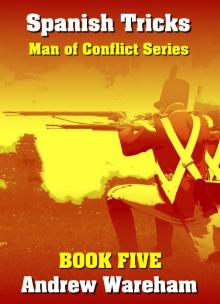 Spanish Tricks (Man of Conflict Series, Book 5)
Spanish Tricks (Man of Conflict Series, Book 5) A Parade Of Virtue (A Poor Man At The Gate Series Book 9)
A Parade Of Virtue (A Poor Man At The Gate Series Book 9)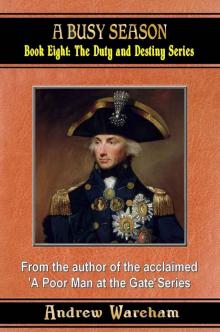 A Busy Season (The Duty and Destiny Series, Book 8)
A Busy Season (The Duty and Destiny Series, Book 8) Billy Bacon and the Soldier Slaves (Colonial Warrior Series, Book 1)
Billy Bacon and the Soldier Slaves (Colonial Warrior Series, Book 1) Raging Rajahs (Man of Conflict Series, Book 2)
Raging Rajahs (Man of Conflict Series, Book 2)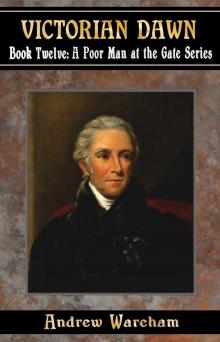 Victorian Dawn (A Poor Man at the Gate Series, Book 12)
Victorian Dawn (A Poor Man at the Gate Series, Book 12) Born To Privilege (A Poor Man at the Gate Series Book 3)
Born To Privilege (A Poor Man at the Gate Series Book 3)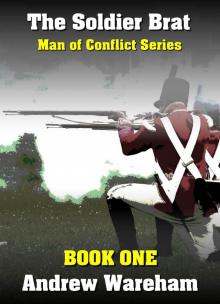 The Soldier Brat (Man of Conflict Series, Book 1)
The Soldier Brat (Man of Conflict Series, Book 1)